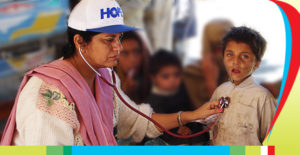Pakistan now taxing NGOs
Pakistan has announced a new tax on not-for-profit organisations that humanitarian groups say will force agencies to cut back on services to some of the world’s most vulnerable people.
Pakistan imposed the tax in June on not-for-profit agencies that spend 15 percent or more of their budget on administrative costs.
Those costs are taxed at a rate of 10 per cent, as would any money left over at the end of the fiscal year if it totals more than 25 per cent of the organisation’s budget.
Some critics see the new tax as part of an ongoing crackdown on civil society, which has seen NGOs stripped of their charity status and shut down, accused of promoting blasphemy, pornography and forced into a labyrinthine registration processes.
The government denies that there is a crackdown and says the new law is simply intended to cut down on waste in order to make sure the money provided to charities makes it to those in need.
“We have imposed taxes on the NGOs to stop misuse of the funds,” a Pakistan Government spokesman said.
 But NGOs say it’s not that simple. One of the affected groups is the Society for Human Rights and Prisoners’ Aid, which provides legal assistance to refugees.
But NGOs say it’s not that simple. One of the affected groups is the Society for Human Rights and Prisoners’ Aid, which provides legal assistance to refugees.
Mudassar Javed, Director of the group’s legal assistance program said the organisation will now need to cut by half the number of lawyers who staff legal aid centres in eight districts.
“We know the refugees in jails are suffering, but we can’t exceed our administrative expenses over 15 percent,” he told IRIN magazine.
“If we pay taxes to the government on donors’ funds, we will be violating our mutual agreement and risking future funding for our projects,” Mr Javed said.
Another charity, MGPO, which helps to mitigate the risks to people in rugged northern areas that are vulnerable to natural disasters like floods from melting glaciers says some administrative costs go into paying staff salaries during the sweltering months from December to March when labour intensive projects like building flood walls need to be put on hold.
MGPO CEO Aisha Khan, says because the organisation works in difficult mountainous areas, they have to keep administrative cost of the projects over 40 percent to ensure their timely completion.
Ms Khan said the government’s imposition of a tax on agencies that spend less than 75 percent of their yearly budgets on programs would damage her organisation’s work because it puts aside some money for planned projects as well as for natural disaster response.
She said some donors had already suggested they may cease their funding as they do not want it to be used to pay the new tax.
Observers say that non-profit groups are likely to challenge the new tax law in court before the end of the Pakistan fiscal year on September 30.
While Pakistan’s tax code defines salaries as administrative costs, the new tax contravenes contracts that NGOs have with donors, which are likely to form the basis of any lawsuits.
Laurie Nowell
AMES Australia Senior Journalist












